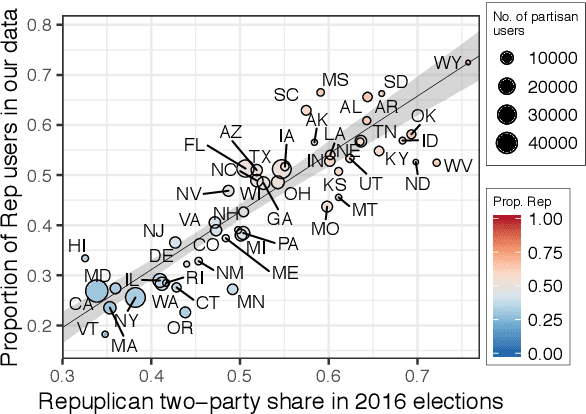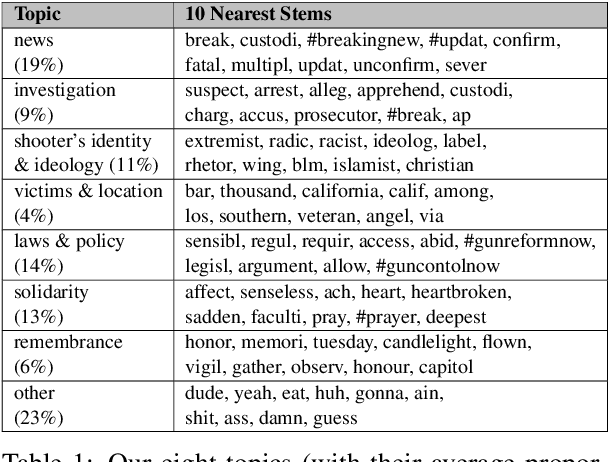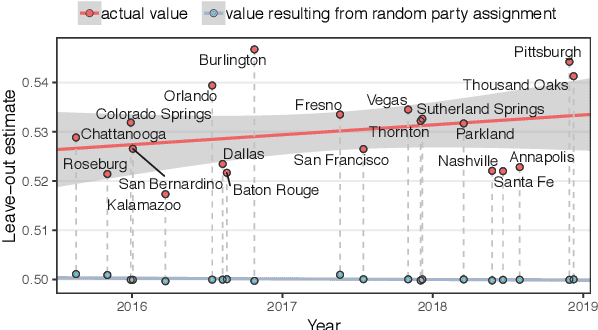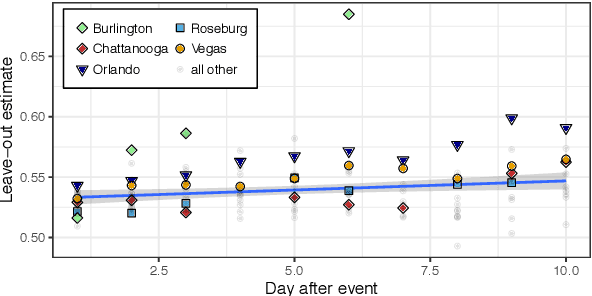Rob Voigt
Good Intentions Beyond ACL: Who Does NLP for Social Good, and Where?
Oct 06, 2025Abstract:The social impact of Natural Language Processing (NLP) is increasingly important, with a rising community focus on initiatives related to NLP for Social Good (NLP4SG). Indeed, in recent years, almost 20% of all papers in the ACL Anthology address topics related to social good as defined by the UN Sustainable Development Goals (Adauto et al., 2023). In this study, we take an author- and venue-level perspective to map the landscape of NLP4SG, quantifying the proportion of work addressing social good concerns both within and beyond the ACL community, by both core ACL contributors and non-ACL authors. With this approach we discover two surprising facts about the landscape of NLP4SG. First, ACL authors are dramatically more likely to do work addressing social good concerns when publishing in venues outside of ACL. Second, the vast majority of publications using NLP techniques to address concerns of social good are done by non-ACL authors in venues outside of ACL. We discuss the implications of these findings on agenda-setting considerations for the ACL community related to NLP4SG.
The Pragmatic Mind of Machines: Tracing the Emergence of Pragmatic Competence in Large Language Models
May 24, 2025Abstract:Current large language models (LLMs) have demonstrated emerging capabilities in social intelligence tasks, including implicature resolution (Sravanthi et al. (2024)) and theory-of-mind reasoning (Shapira et al. (2024)), both of which require substantial pragmatic understanding. However, how LLMs acquire this competence throughout the training process remains poorly understood. In this work, we introduce ALTPRAG, a dataset grounded in the pragmatic concept of alternatives, designed to evaluate whether LLMs at different training stages can accurately infer nuanced speaker intentions. Each instance pairs two contextually appropriate but pragmatically distinct continuations, enabling fine-grained assessment of both pragmatic interpretation and contrastive reasoning. We systematically evaluate 22 LLMs across key training stages: pre-training, supervised fine-tuning (SFT), and preference optimization, to examine the development of pragmatic competence. Our results show that even base models exhibit notable sensitivity to pragmatic cues, which improves consistently with increases in model and data scale. Additionally, SFT and RLHF contribute further gains, particularly in cognitive-pragmatic reasoning. These findings highlight pragmatic competence as an emergent and compositional property of LLM training and offer new insights for aligning models with human communicative norms.
Do Reasoning Models Show Better Verbalized Calibration?
Apr 09, 2025Abstract:Large reasoning models (LRMs) have recently shown impressive capabilities in complex reasoning by leveraging increased test-time computation and exhibiting behaviors akin to human-like deliberation. Despite these advances, it remains an open question whether LRMs are better calibrated - particularly in their verbalized confidence - compared to instruction-tuned counterparts. In this paper, we investigate the calibration properties of LRMs trained via supervised fine-tuning distillation on long reasoning traces (henceforth SFT reasoning models) and outcome-based reinforcement learning for reasoning (henceforth RL reasoning models) across diverse domains. Our findings reveal that LRMs significantly outperform instruction-tuned models on complex reasoning tasks in both accuracy and confidence calibration. In contrast, we find surprising trends in the domain of factuality in particular. On factuality tasks, while Deepseek-R1 shows strong calibration behavior, smaller QwQ-32B shows no improvement over instruct models; moreover, SFT reasoning models display worse calibration (greater overconfidence) compared to instruct models. Our results provide evidence for a potentially critical role of reasoning-oriented RL training in improving LLMs' capacity for generating trustworthy, self-aware outputs.
Sympathy over Polarization: A Computational Discourse Analysis of Social Media Posts about the July 2024 Trump Assassination Attempt
Jan 17, 2025



Abstract:On July 13, 2024, at the Trump rally in Pennsylvania, someone attempted to assassinate Republican Presidential Candidate Donald Trump. This attempt sparked a large-scale discussion on social media. We collected posts from X (formerly known as Twitter) one week before and after the assassination attempt and aimed to model the short-term effects of such a ``shock'' on public opinions and discussion topics. Specifically, our study addresses three key questions: first, we investigate how public sentiment toward Donald Trump shifts over time and across regions (RQ1) and examine whether the assassination attempt itself significantly affects public attitudes, independent of the existing political alignments (RQ2). Finally, we explore the major themes in online conversations before and after the crisis, illustrating how discussion topics evolved in response to this politically charged event (RQ3). By integrating large language model-based sentiment analysis, difference-in-differences modeling, and topic modeling techniques, we find that following the attempt the public response was broadly sympathetic to Trump rather than polarizing, despite baseline ideological and regional disparities.
Causal Micro-Narratives
Oct 07, 2024Abstract:We present a novel approach to classify causal micro-narratives from text. These narratives are sentence-level explanations of the cause(s) and/or effect(s) of a target subject. The approach requires only a subject-specific ontology of causes and effects, and we demonstrate it with an application to inflation narratives. Using a human-annotated dataset spanning historical and contemporary US news articles for training, we evaluate several large language models (LLMs) on this multi-label classification task. The best-performing model--a fine-tuned Llama 3.1 8B--achieves F1 scores of 0.87 on narrative detection and 0.71 on narrative classification. Comprehensive error analysis reveals challenges arising from linguistic ambiguity and highlights how model errors often mirror human annotator disagreements. This research establishes a framework for extracting causal micro-narratives from real-world data, with wide-ranging applications to social science research.
Language of Bargaining
Jun 12, 2023Abstract:Leveraging an established exercise in negotiation education, we build a novel dataset for studying how the use of language shapes bilateral bargaining. Our dataset extends existing work in two ways: 1) we recruit participants via behavioral labs instead of crowdsourcing platforms and allow participants to negotiate through audio, enabling more naturalistic interactions; 2) we add a control setting where participants negotiate only through alternating, written numeric offers.Despite the two contrasting forms of communication, we find that the average agreed prices of the two treatments are identical. But when subjects can talk, fewer offers are exchanged, negotiations finish faster, the likelihood of reaching agreement rises, and the variance of prices at which subjects agree drops substantially. We further propose a taxonomy of speech acts in negotiation and enrich the dataset with annotated speech acts. We set up prediction tasks to predict negotiation success and find that being reactive to the arguments of the other party is advantageous over driving the negotiation.
Large Language Models Are Partially Primed in Pronoun Interpretation
May 26, 2023Abstract:While a large body of literature suggests that large language models (LLMs) acquire rich linguistic representations, little is known about whether they adapt to linguistic biases in a human-like way. The present study probes this question by asking whether LLMs display human-like referential biases using stimuli and procedures from real psycholinguistic experiments. Recent psycholinguistic studies suggest that humans adapt their referential biases with recent exposure to referential patterns; closely replicating three relevant psycholinguistic experiments from Johnson & Arnold (2022) in an in-context learning (ICL) framework, we found that InstructGPT adapts its pronominal interpretations in response to the frequency of referential patterns in the local discourse, though in a limited fashion: adaptation was only observed relative to syntactic but not semantic biases. By contrast, FLAN-UL2 fails to generate meaningful patterns. Our results provide further evidence that contemporary LLMs discourse representations are sensitive to syntactic patterns in the local context but less so to semantic patterns. Our data and code are available at \url{https://github.com/zkx06111/llm_priming}.
Analyzing Polarization in Social Media: Method and Application to Tweets on 21 Mass Shootings
Apr 04, 2019



Abstract:We provide an NLP framework to uncover four linguistic dimensions of political polarization in social media: topic choice, framing, affect and illocutionary force. We quantify these aspects with existing lexical methods, and propose clustering of tweet embeddings as a means to identify salient topics for analysis across events; human evaluations show that our approach generates more cohesive topics than traditional LDA-based models. We apply our methods to study 4.4M tweets on 21 mass shootings. We provide evidence that the discussion of these events is highly polarized politically and that this polarization is primarily driven by partisan differences in framing rather than topic choice. We identify framing devices, such as grounding and the contrasting use of the terms "terrorist" and "crazy", that contribute to polarization. Results pertaining to topic choice, affect and illocutionary force suggest that Republicans focus more on the shooter and event-specific facts (news) while Democrats focus more on the victims and call for policy changes. Our work contributes to a deeper understanding of the way group divisions manifest in language and to computational methods for studying them.
 Add to Chrome
Add to Chrome Add to Firefox
Add to Firefox Add to Edge
Add to Edge